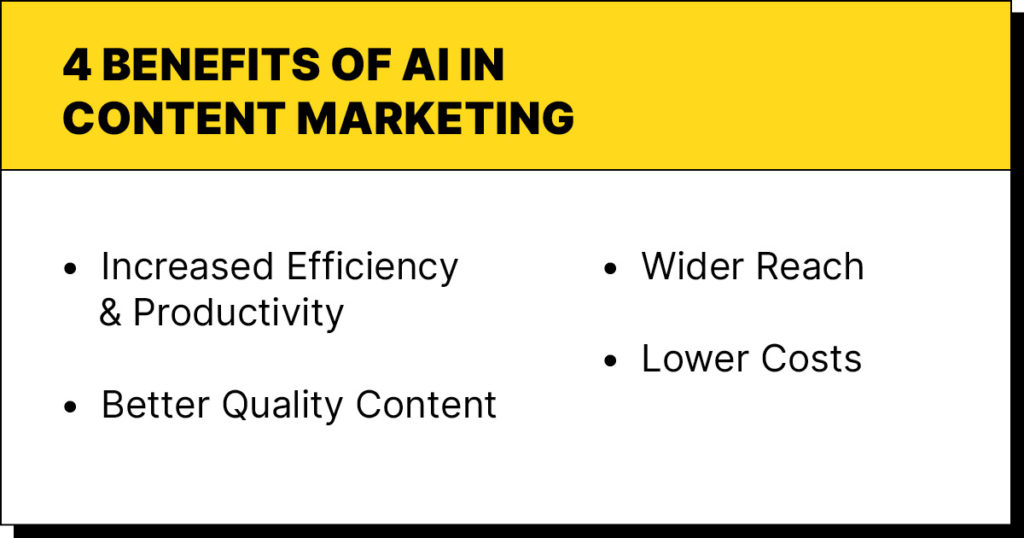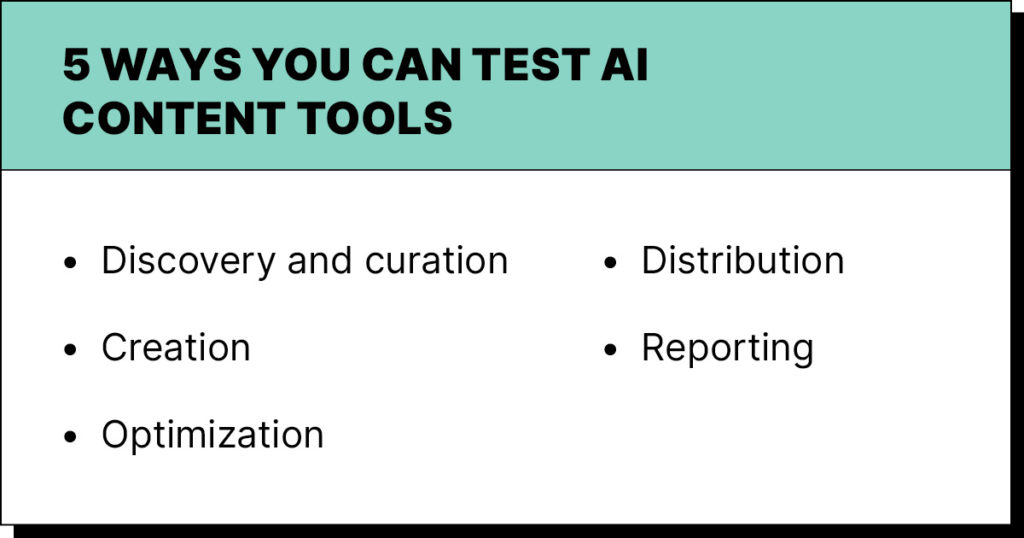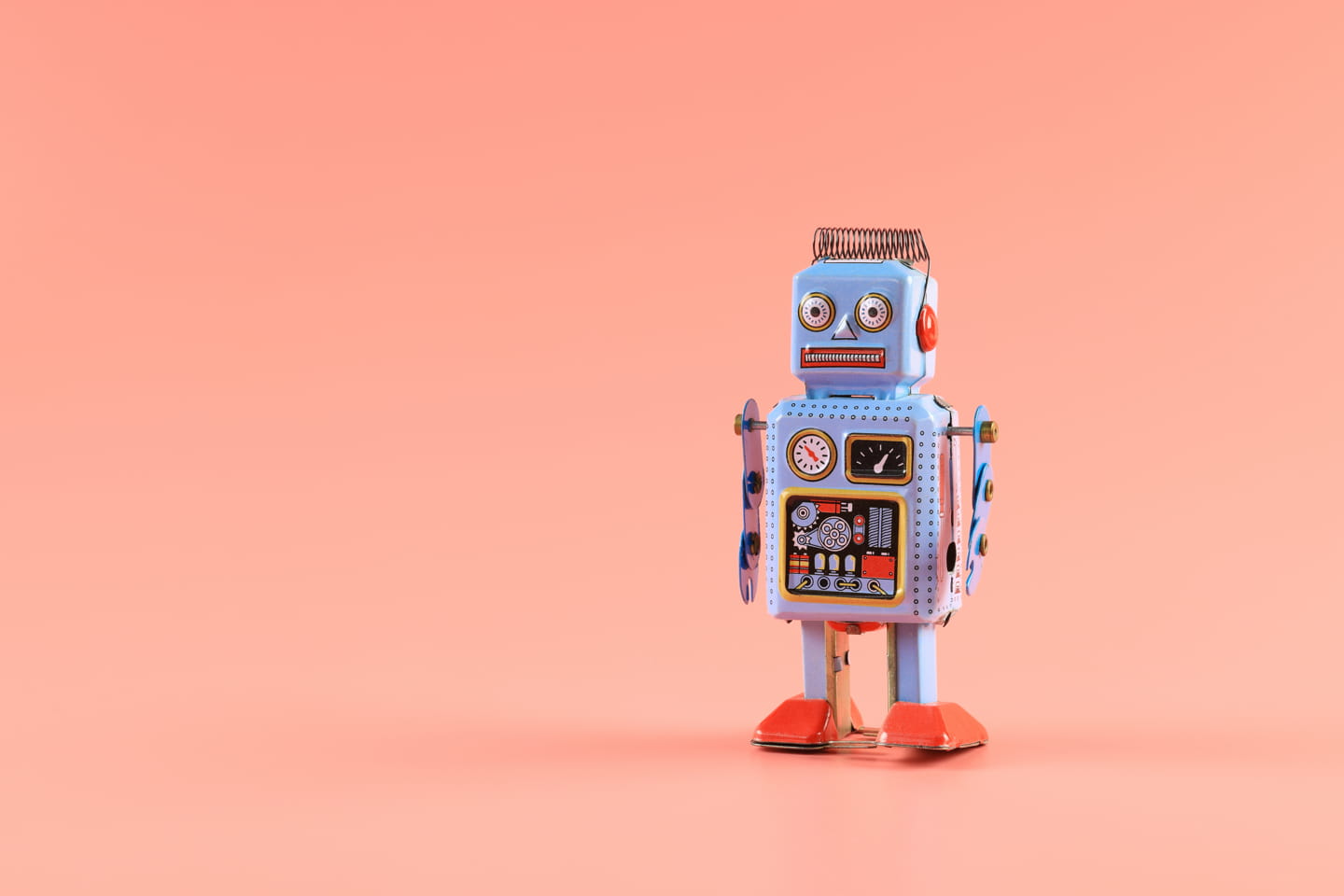You’re probably using artificial intelligence (AI) tools at work, maybe without realizing it. But with the buzz around ChatGPT and other AI-based language models, you’re wondering what AI in content marketing means for your brand.
You might even be worried about your job given the increased sophistication of AI. That’s completely understandable. Let us tell you that while AI is here to stay, it can actually become your biggest ally.
We’ll explain what AI means for content marketing, where you can use it and how to embrace our AI-influenced future.
Defining AI for Content Marketers
AI is changing how people communicate and what they consider the human touch. To understand how AI affects content marketing, we must first understand what AI is and what the most common terms are.
What Is AI?
AI can generally be defined as a computer system’s ability to perform tasks that ordinarily require human intelligence, such as visual perception, natural language processing and problem-solving.
Demis Hassabis, the founder and CEO of AI company DeepMind, has described modern AI as “capable of learning on their own from first principles” rather than being bound by human-created rules and code.
AI is often used as a catch-all term, but it’s not the only phrase to know.
- Artificial intelligence is the use of computers and machines to mimic human behavior, including analyzing situations and making decisions. This is the definition most of us know, and it encompasses machine learning and deep learning.
- Machine learning is a component of AI. It’s when a computer can learn without being explicitly programed. Rather than using complex coding software routines, machine learning is designed to train the algorithm to learn over time by absorbing vast amounts of data. The algorithm adjusts and improves.
- Deep learning is machine learning with a pinch of spice. This component uses algorithms to create artificial neural networks that can learn and make decisions independently.
“So with the emergence of the internet and the huge increase in the amount of digital information being generated, it’s become much more feasible to do this machine learning because we can teach computers and machines how to do it all,” says Jared Loftus, strategic adviser at Rasa.io and founder and CEO of MaxBoring. “And it’d be far more efficient to code them to think like human beings, then plug them into all of this information so that that can give it the experience to take it forward.”
How AI Is Changing Content Marketing
Expect AI to revolutionize how businesses approach content marketing, starting by automating mundane tasks associated with content creation and distribution.
AI can already be used, in part or in whole, for tasks such as content generation, curation and analysis. For example, AI can help content creators deliver customized marketing copy or images based on customer preferences and behavior. AI marketing tools help your employees quickly analyze large amounts of user data to identify trends and generate insights into user behavior.
You still need people. AI won’t produce perfect content, and AI-based data analysis is no substitute for strategic decision-making and context. But AI can be a valuable contributor to your content marketing team that’s available 24/7.
“AI simply has one capability that humans do not have: the ability to process data at a speed that seems near-instantaneous to our minds,” says Paul Roetzer, founder of the Marketing Artificial Intelligence Institute.
4 Benefits of AI in Content Marketing
We can’t ignore AI’s potential to disrupt content marketing. But change doesn’t have to be bad. Here are some of the ways AI can help marketers be more efficient and effective
Increased Efficiency and Productivity
AI-powered tools can automate tasks, such as creating personalized content for each user or segmenting audiences. This means marketers can get significantly more done in less time, freeing up resources for other activities. AI content marketing tools also allow marketers to:
- Quickly analyze large amounts of data.
- Identify trends and insights.
- Make decisions accordingly.
Better Quality Content
AI can help produce high-quality content by optimizing topics, titles, images, videos and more based on user preferences and interests. While first-draft AI content might be unimpressive, the sheer volume of ideas it can produce in the short term can help your creatives generate final products more quickly.
“Imagine a team of 100 writers and five editors (a common occurrence). Without a content AI platform, the editors would be working overtime to whip all that content into shape,” says May Habib, co-founder and CEO of Writer. “But with an AI writing assistant on their side to catch style, language, voice and clarity issues, writers can continue to crank out content, and editors have help getting through their side faster.”
In addition, AI can help you repurpose your long-form content quickly and effectively through short-form content at scale. This approach can lead to shorter turnaround times while ensuring accuracy and brand consistency.
Wider Reach
With AI-powered tools available for social media management — such as scheduling posts or finding influencers to collaborate with — marketers can easily reach a wider audience than ever before. AI-driven algorithms can detect patterns in user behavior so you can determine which type of content resonates most with your target audience. If you’re using popular social media management platforms, you’re probably benefiting from AI’s influence.
Lower Costs
By using AI content marketing tools to automate processes within your marketing campaigns, you can reduce labor costs by getting more out of your staff and outsourcing fewer tasks and projects. Another example is AI’s ability to help your team produce better-quality first drafts. Fewer rewrites and less editing gives time back to your editors and helps them be more productive and strategic.

5 Challenges of Using AI in Content Marketing
AI is not perfect or a panacea. And most content marketing teams will experience a learning curve. Let’s explore some of the most common challenges of AI content marketing tools.
Data Quality
The quality of data is one of the most important factors when using AI in content marketing. Poor data quality will lead to inaccurate or incomplete results and limit the effectiveness of any decisions you make. To ensure you’re getting accurate results from AI-powered content marketing, you must have high-quality training data and regularly updated data sets for testing and validation. The tools and vendors you select also influence your data quality and your ability to analyze the information.
Training Data
Another challenge of using AI tools is having enough training data so that your machine learning models can learn and deliver strong results. Without enough training data, the models won’t accurately represent customer behavior or predict customer outcomes correctly. Therefore, it’s important to constantly collect new data points and update your databases regularly so your models are always current.
Interpretability
Interpretability is the ability of machines to understand what they have learned from the data sets used for training purposes. While interpretability isn’t necessarily required for all types of AI applications, it is essential when dealing with customer segmentation or personalization tasks. This is because it allows marketers to gain an understanding of why certain customers behave differently than others. This knowledge can then be used to inform future campaigns and initiatives.
Generalization
Generalization refers to how well an AI model can apply what it’s learned from a particular data set to other data sets, as well as new scenarios outside its original environment. Because customer preferences change over time, generalizing across different data sets is essential for successful AI-powered content marketing campaigns. Solving for this challenge means your campaigns stay relevant even as your customer segments and markets evolve.
Change Management
Change management is another key challenge, due to its dynamic nature. No one can predict every knock-on effect of a change decision, especially with complex processes and many variables. This makes predicting outcomes more complicated than traditional methods such as A/B testing or surveys that use fixed variables and scenarios over given periods of time.
As a result, marketers need strategies that allow them to monitor and react to changes quickly instead of relying solely on automated processes run by machines alone. This is a prime example of how AI can help content marketers but can’t necessarily be treated like a “set and forget” option.

5 Areas To Test AI Tools
AI-powered tools can be incredibly helpful for content marketers, but figuring out where to get started can be its own challenge. The good news is you probably have no shortage of options.
“Things that every editor does are done exclusively manually right now. And none of it should be. Every one of those can be assisted by a machine,” Paul says.
Here are five areas to consider applying AI.
Content Discovery and Curation Tools
Content discovery tools use AI algorithms to help find high-quality content related to your industry from around the web. From there, you can curate the best content to share on your blog or social media channels. Other tools help you focus on keyword research to ensure that your content matches what people are searching for.
There are many content discovery tools available, including:
Content Creation Tools
AI-based writing assistants can help you generate SEO-friendly blog posts and many other types of content in a fraction of the time it takes a human content writer working alone. These alternatives to ChatGPT also help optimize your existing content for better search engine rankings, as well as suggest related topics for subsequent posts.
Popular AI-based writing assistants include:
- Claude
- Copy.ai
- Copymatic
- Google Bard
- GrowthBar
- Jasper
- InferKit
- Lately
- Microsoft Copilot
- Rytr
- Textsynth
- Writer
- Writesonic
Optimization Tools
Natural language processing (NLP), natural language generation (NLG) and sentiment analysis tools allow you to understand how readers feel about certain topics and topics they care about most. That way, you can adjust your content accordingly in real time.
You can also use these optimization tools to identify areas where users may need extra support or clarification on an issue, allowing you to make improvements quickly and easily if necessary.
Distribution Tools
Social distribution platforms use AI algorithms to analyze user data and determine the types of messages most likely to resonate with specific audiences at particular times of day or weekdays. This enables more effective sharing across all channels and creates maximum impact over time.
Popular social distribution platforms that use AI include:
Reporting Tools
AI-based reporting tools provide detailed insights into website traffic, user engagement metrics, conversion rates, page views per session, bounce rate and more. This allows marketers to track performance over time and make corresponding decisions to increase ROI.
There are many reporting tools to choose from, depending on your organization’s needs, including:
Embrace AI-Generated Content Marketing
AI’s potential is huge and will only continue to grow. Your role as a content marketing leader is to be proactive, optimistic and realistic about AI’s capabilities and limitations. When leveraged well, AI can increase your output without sacrificing brand consistency. It can help you be a better editor by flagging errors and suggesting improvements. Your campaigns can better reach their target audiences while reducing the costs and time associated with formerly manual tasks. And even as your campaigns are unfolding, AI can help you identify customer insights that can spark on-the-fly adjustments, create tailored experiences and produce higher engagement across all channels.
AI in content marketing is the future and, increasingly, the present. Start exploring how an AI content creation tool can help your team do more work without sacrificing quality and separate yourselves from the competition.
Think you can tell the difference between a human writer and an AI program? Take our short quiz to find out!






